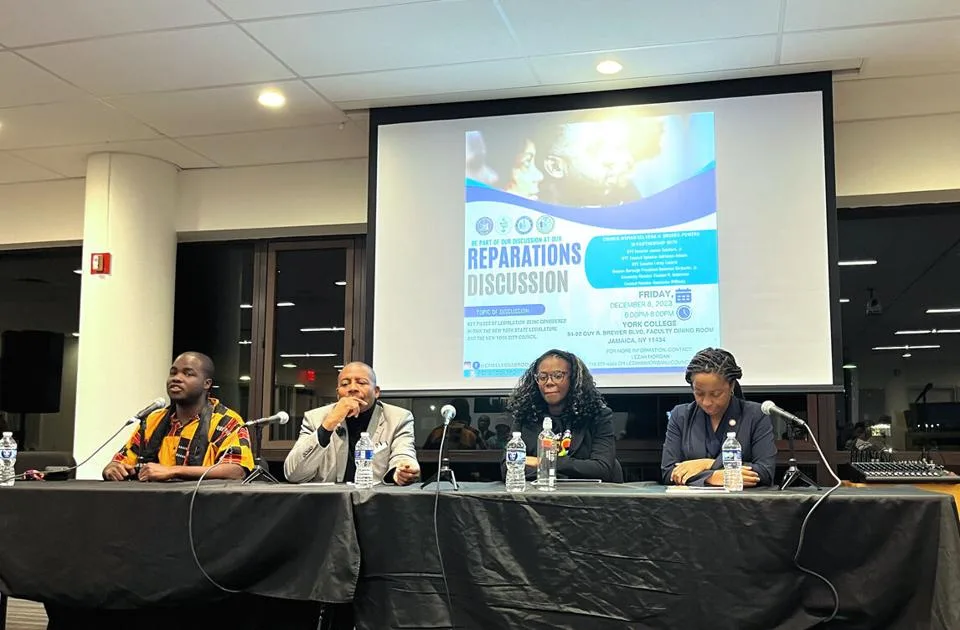
As the Dec. 31 deadline approaches for Gov. Hochul to sign the Reparations Bill sponsored by state Sen. James Sanders Jr. (D-South Ozone Park), elected officials and community members alike have voiced frustration regarding her inaction, and proponents of the bill continue to raise awareness about what they view as its urgency.
Sanders’ bill aims to conduct a comprehensive study of the cruel and devastating effects of slavery and its aftermath in New York City. Sanders seeks to establish a nine-person committee, composed of individuals who have extensive knowledge regarding racial justice, to provide specific recommendations for reparations. The bill also raises awareness of slavery in New York City in an effort to combat the popular belief that it was exclusively a Southern institution.
“For a while, outside of Charleston, no place had more slaves than New York City,” Sanders said last Friday evening at a Reparations Symposium at York College in Jamaica. “If ever there was a state and a city that needs to do right, and do reparations, that state is called New York.”
The bill passed the Assembly 105-42 and state Senate 41-21. Assemblyman Khaleel Anderson (D-South Ozone Park), who was also a panelist at Friday’s symposium, called the bill a “no brainer.”
“It’s funny that we’re in this predicament, that we’re looking at a Democratic governor, a Democratic Assembly, a Democratic Senate,” Anderson said. “Your governor is not taking you seriously … she’s not taking your vote seriously. So I encourage and urge everybody to please write your government.”
Also present at the symposium were Councilwomen Nantasha Williams (D-St. Albans) and Selvena Brooks-Powers (D-Laurelton), who have long been advocating for bills that seek to reconcile racial injustices. The City Council is currently considering two additional bills on this issue, 1082 and 1073, which would create a citywide task force to consider reparations and establish a truth, healing and reconciliation process, respectively.
“We know that a legacy of slavery endures in America including here in New York City,” Brooks-Powers said. “This conversation about reparations is a way to engage with this legacy, to look honestly at how our communities are still being impacted by discrimination.”
Sanders referenced a recent report released by city Comptroller Brad Lander, which details a dismaying racial wealth gap in the state. The report found that white households in New York have a median net worth almost 15 times higher than Black households. Sanders called the report “horrifying,” but acknowledged that “without information, real data, you can’t move forward.”
The state senator spoke at length about the racial wealth and economic gap, saying that the concept of Black Americans “catching up” to white Americans is a stark one.
“You can work three jobs, and your children can work three jobs,” he said. “And you will not catch up … It is not simply a question of a need to pull yourself up by your bootstraps. That will work if you had boots, if somebody didn’t cut off your leg.”
Though speakers answered every question from the audience, some attendees were not fully satisfied with their responses. One participant asked the panelists to state a concrete amount of money that would be included in reparations. In response, Sanders said that reparations are more than just a check.
“The check is the least of the things that we’re talking about,” Sanders said. “You cannot put a dollar amount on the misery that our people have suffered.”
Some of the approximately 25 attendees called out in opposition while Sanders was speaking, demanding that the elected officials voice an amount.
“Slavery was about money. You should have an amount in your mind that shows what that number was,” one participant said. Despite multiple prompts from the audience, Sanders refused to state a number.
Anderson reminded the audience that “today we’re talking about and presenting legislation that’s in front of us … there is no bill that’s in front of the governor right now that dictates a specific amount of how much money should be given.” Panelists reminded participants that the specifics of reparations would be the result of a year-long study conducted by the commission.
“If you want a specific dollar amount, you should present that to the commission after the bill is passed, when the governor signs it. And at that commission, your voices can be heard as to what specific remedies should exist,” Anderson said.
The panel discussed different ways that reparations can be effective, including supporting Black students’ college tuition and funding organizations that assist Black families with housing, an initiative that is already being implemented in San Francisco, said Williams.
“In the reparations conversation, there are many different layers and many different philosophies on how reparations should be given,” she continued.
Anderson acknowledged that the full weight of reparations cannot be summed up in one bill, but emphasized that legislation is a critical step in moving forward.
“This is not your perfect piece of legislation to address the issue of reparations,” he said. “But it moves the conversation forward, where it has long been stalled.”
The panelists emphasized the importance of calling representatives and voicing consistent support for the legislation. Demonstrations have taken place over the past several weeks in Washington Square Park and Albany, and panelists urged audience members to continue using their voices to advocate for the governor to sign the bill.
Though tensions arose between elected officials and community members, the speakers emphasized their commitment to their constituents.
“I look forward to continuing the work and to work with my colleagues at the city and state levels, to figure out how we can address historic discrimination and ensure communities of color have access to the support, resources and services that we deserve,” Brooks-Powers said.
Anderson said the purpose of the bill is to address systemic racism.
“As your elected leaders, it’s important for us to not just deal with the day-to-day, but take a bird’s-eye view,” he added, “… ranging on the things that are impacting us: why our communities are historically underfunded, why our schools are not educating our young people, why housing is so hard to achieve.”


